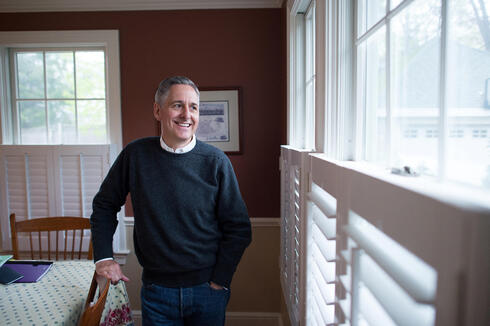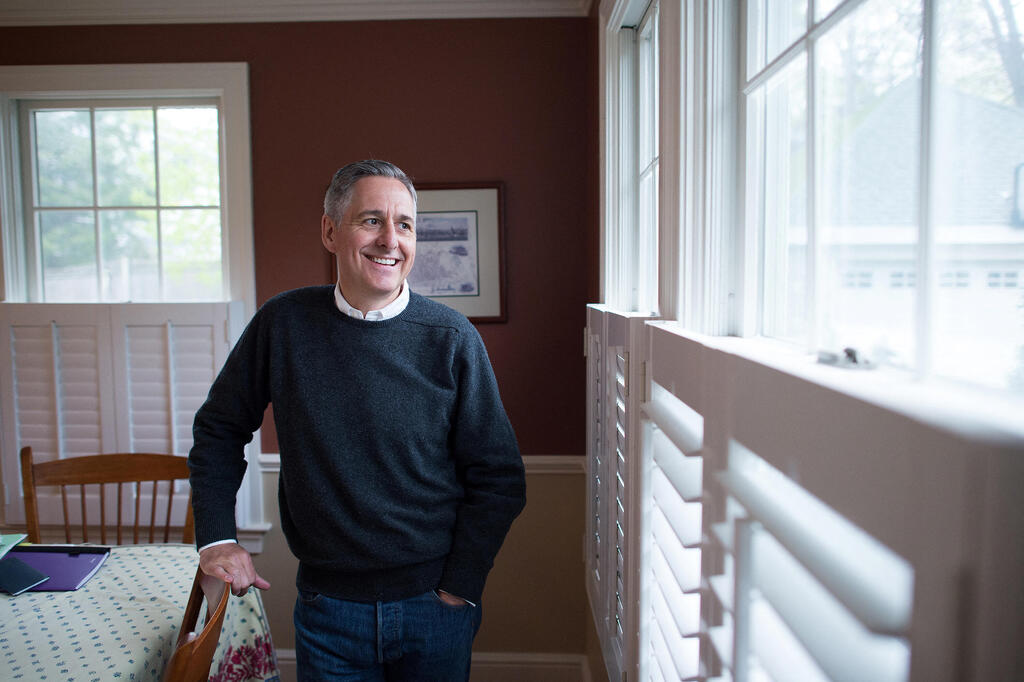
Listen up: Self-confessed overtalker Dan Lyons preaches less talking, more listening
As a senior reporter, screenwriter, and successful author, Dan Lyons has built a glorious career from words. However, an excess of words damaged his life, livelihood, and even his marriage because he did not know when to shut up. So, he decided to investigate the phenomenon of compulsive talkativeness. The result is his book “STFU: The Power of Keeping Your Mouth Shut in an Endlessly Noisy World.” In an interview with Calcalist, he explains how, in a world where everyone has something to say, we can all calm down, talk less, and listen more: "Even my wife thinks I'm less annoying now."
Dan Lyons is good with words. As someone who has more than three decades of making a living from words on his resume, among other things as a senior technology reporter for Forbes and Newsweek, as one of the screenwriters of the hit series Silicon Valley and as the author of bestsellers - you can even say that he is a phenomenon of words. But words are a double-edged sword. "I've always been someone about whom they say, 'Okay, he talks a lot, or too much,'" he tells Calcalist. "I like talking to people, and I've always thought of it as a good thing. Because I can talk to anyone, it's easy for me. But at some point I realized that it's also an annoying or insulting thing. And in one case it also cost me a job that I wish I hadn't lost."
When Lyons (64) says "lost," he means it. In 2013, he worked in the marketing department of HubSpot, an ambitious start-up for marketing and sales software, which was in talks over recent months to sell to Alphabet at a value of $35 billion. When the company's CEO at the time, Brian Halligan, told The New York Times in an interview that "in the technology business, gray hair and the experience that comes with it are overvalued," Lyons, then 52, got angry and wrote a scathing post about him on Facebook, which went viral. In response, he was fired immediately. If he had just kept his mouth shut and stayed in his position for four years, the options he had in hand would have earned him at least $8 million. "To this day, I have post-traumatic stress just from hearing the company's name," he says now, laughing.
But instead of agonizing, Lyons decided to make lemonade out of the lemons and write a book about talkaholics - people who are addicted to talking and are unable to stop, even when they know it will harm them. "STFU: The Power of Keeping Your Mouth Shut in an Endlessly Noisy World" was published last year and became an instant hit, which was translated into more than 20 languages, including Hebrew (under the name "Silence Is Golden", published by Or-Am). Time magazine even devoted a cover story to him, and Barack Obama's former speechwriter, David Litt, highly recommended it, calling it, "Timely, clever, and important."
The term "Talkaholic" was coined for the first time in 1993 by Virginia Richmond and James McCroskey, a pair of interpersonal communication researchers from West Virginia University. As Lyons details in his book, talkaholics "can't just wake up one morning and decide to talk less. Their speech is compulsive. They don't just talk a little more than everyone else, but a lot more, and they do it all the time, no matter what the situation or circumstance, even when they know that other people think they talk too much, and worst of all, talkaholics keep talking even when they know what they're about to say will hurt them. They just can't stop."
According to the study, 5% of the population has talkaholism - a personality pattern that tramples every good part of a person's relationships with those around them, and is correlated with narcissistic personality disorder, bipolar personality disorder and attention deficit disorder.
Richmond and McCrosky composed a 16-question questionnaire for the diagnosis of the "talkaholic scale", and when Lyons filled it out for the first time, he received the maximum score. "I was a ball of anxiety then, and talking too much was a way to calm myself down," he says now. "But it's a cycle that feeds itself - talking too much only intensifies the anxiety and vice versa - and it's so hard to break it."
Therefore, writing the book began as a personal matter for him. "I corresponded with my agent about the aftermath of my snarky comment," he recalled. "I pointed out to her that all of this would have been avoided if I had just shut up, and used the acronym STFU (Shut The Fuck Up). She immediately replied: 'It could be a book.' I wondered if there's something behind it, and when I dived in I discovered that the scientific research in the field of speech is fascinating, and most of us don't know about it. How can it be that we monitor our steps and our sleep, but never pay attention to the words that come out of our mouths?"
Who talks more: men or women?
Lyons interviewed dozens of speech experts from different fields for his book - historians, social scientists, political scientists, communication lecturers, management coaches and psychologists. "Learning to keep your mouth shut will change your life," he promises his readers already in the introduction to the book. "It will make you smarter, more likable, more creative, and more powerful. It may even help you live longer. People who talk less are more likely to get promotions at work and win negotiations. Speaking with intention—in contrast—improves our relationships, makes us better parents, and can inject energy into our mental and even physical well-being."
Give me an example of how reducing talking and focusing on talking with intention can improve our lives.
"The psychologist Prof. Matthias Mehl and his team at the University of Texas at Austin equipped 400 students with a recording device, monitored the number of words they said per day, and then ran all kinds of analyses of them. The first analysis they did was to find out who spoke more, men or women. Thus they shattered the ancient myth according to which women speak more (a 2007 study found that they speak as much as men, 16,000 words per day on average).
"The next analysis they did in 2010 was of the words the students used and the content of the conversations they had, trying to understand if there is a correlation between deep conversations versus small talk and the level of happiness. And they discovered that those who had the best conversations were the happiest. When they crossed the data with blood tests , they found that these people also had better immune systems."
Does this mean that the quality of life and health can be improved by having deeper conversations?
"It's a gray area, but Mehl is convinced it's possible. His standard line is 'Take two calls and call me in the morning,' meaning that a call is medicine. He's currently working with Harvard Medical School, where they claim that people who have had a stroke recover faster if they manage meaningful conversations. They are not always interested in this, because their speech is sometimes affected, and they are aware of it, but if it works for them anyway, then what are the chances that it won't work with healthy people?"
Now I'm confused. So actually talking a lot is good?
"That's exactly the point. The point is not to talk a lot but to have good conversations - which often means not to talk a lot, but more to listen and ask questions."
What are good conversations?
"For example asking 'how are you?' With intention, not as a greeting or as something polite, but in a way that will make the other person understand that you are really interested in hearing how they are doing, which is unlikely to start with the words ‘how about this weather' or 'your dog looks good today!' The same superficial crap that makes me hate the dog park in our neighborhood. Do you happen to have a dog?".
No, unfortunately. But my trick is to simply avoid eye contact.
"Yes, it's a good trick. I use it sometimes too. We have a neighbor who immigrated from France, and probably feels lonely. If you run into her when she's out with her dog, she just flanks you and keeps walking beside you, so every time I see her I immediately shout that I'm in a hurry to go somewhere. I don't even bother to come up with a proper excuse. My wife thinks it's impolite, so she stays another half hour because of her."
I would suggest that you give your neighbor your book as a gift, but that might be a bit awkward.
"Originally I thought people would buy this book for those who need it, but now I realize it's too cheeky. Even the name of the book can be offensive. Towards the end of working on it, I wanted us to drop STFU, because I thought the title would kill the book. But then the book got a cover story in 'Time Magazine' and from there it was already too late to change."
Everything lies in the right lobe of the brain
Lyons likes to give Angela Merkel, the former chancellor of Germany, as an example of a powerful leader who knew how to keep quiet. "She is an unusually quiet person," he says. "This is a woman who defeated all the men around her by sitting back and waiting for the right moment to strike. Legend has it that when she met with Barack Obama—another unusually quiet man—they drove each other crazy because they were both just silent. She didn't know what to think about him."
The opposite example to Merkel is the President of the United States, Joe Biden, who sabotaged his own career because he was a compulsive talker. "Biden has been trying to run for president since 1988, and every time he has destroyed himself simply because he couldn't keep his mouth shut," says Lyons. "He always somehow managed to hurt someone." For example, in 2008 when he met a reporter of Indian origin, he told him: "In Delaware, the largest increase in the population is of immigrants from India. You can't go to a corner store or Dunkin’ Donuts if you don't have a bit of an Indian accent. Am I right?". At a rally in South Carolina, he called on the state senator to "stand up so everyone can see you," and only later remembered he was confined to a wheelchair.
In the 2020 election, which he ultimately won, Biden hired a speech coach. "And thanks to him, Biden has become very restrained, very disciplined. He says what he has to say, and then they take him away from the reporters to minimize the risk of mistakes, they don't let him just sit there and talk. It gave me hope. And of course, also endless worry about his last debate with Donald Trump".
In "STFU" Lyons diagnoses six types of over-talkers: Ego-talkers, who are almost always men. "These are the guys with the loud voice, who know everything, interrupt the conversations and take over them, because they believe that their ideas are better than everyone else's, even when they have no idea what they are talking about"; Nervous talkers — these suffer from social anxiety, and "talk themselves out" to relax; The Blabbers — those who are stuck in a loop of negative thoughts and manage their inner thinking out loud; Blurters - eloquent and quick-thinking types, but without filters; Ruminators - people who spew nonsense, tell the same stories over and over, and continue even when they try to interrupt them; And of course talkaholics, who are, as mentioned, "the worst offenders" because of their tendency to self-destruct.
The bad news is that the cause of excessive talkativeness is biological. According to Prof. Michael Beatty, the pioneer of communibiology (a field that studies interpersonal communication as a biological phenomenon), talkaholism results from an imbalance in the neuronal activity of the left and right lobes of the brain. When the right lobe is dominant, you get an above average talker. And the greater the imbalance, the more intense their rhetoric. The good news is that there is still something to be done about it, although it requires hard work.
Lyons' routine for curbing talkaholism is based on five basic principles: talk less ("pretend words are money, and spend them wisely"); Become an expert at speech pauses ("Imitate the trick invented by Ruth Bader Ginsburg's clerks to wait two seconds before speaking. Take a breath. Let the other person process what you just said"); Get off social media ("Over-tweeting is the cousin of over-talking, and it's almost impossible not to fall into the trap"); Seek silence ("Disconnect. Spend time without your phone. Don't talk, don't read, don't watch content, don't listen to content. Resting your brain is a way to reboot your creativity, which also makes you healthier and more productive"); And last but not least, learn how to listen.
How hard it is to listen
Listening is the name of the game, as mentioned, but it is also the most complex challenge of all. "Being a great listener is considered such an important business skill that CEOs go to training camps just to learn how to do it," Lyons writes in the book. Unlike hearing, listening is an active and very tiring effort, and not listening is the other side of overtalking— equally disastrous. Take doctors for example, who wait an average of 18 seconds before interrupting a patient (as of 2007). One can only imagine the potential damage.
"It's very hard mentally to train your brain to listen to one person without doing something else," Lyons explains. "Think, for example, that you are riding a horse and trying to direct it to go straight while it wants to go sideways - it's exhausting. Only 10% of people are effective listeners, and we retain only 25% of what we hear in our memory."
And if the challenge of having meaningful conversations wasn't difficult enough, the rise of social networks only added to it. "Social media has taught us to talk instead of listen," Kalev Leetaru of George Washington University says in the book. "It failed in the most important part of its promise: to bring us closer together. Instead of creating a place where we can gather together and have a conversation in the global city square, we find ourselves among giant gladiators of megaphones where the loudest and most toxic prevails over its opponents."
Social networks also make us more self-centered: in normal conversations people talk about themselves 60% of the time, compared to 80% of the time on Facebook and X (Twitter). Moreover, they encourage us to be more nervous. "Users who want to increase their follower numbers quickly find that posts with angry or emotionally charged comments generate more shares, comments and likes — so they start doing it more," according to STFU. Researchers at Yale University, who went through 1.2 million tweets from 7,000 Twitter users, found that their tweets became angrier and more extreme over time. Those same people also began to post more frequently—that is, they became talkaholics, roaming the virtual spaces in search of arguments. "The changes in social media create positive reinforcements to intensify anger," explains Prof. Molly Crockett, the neuroscientist who led the study at Yale, in the book.
For this reason, being careful to shut up and listen is an important medicine for calming the spirits around us. "When a person talks, they release dopamine, which makes them feel better - right at the animal level, of the primitive brain," Lyons explains. "While listening is hard. That's why when you take an interest in the person in front of you and ask them questions, you make them feel better."
In the book, you explain that effective listening is also very important for managers at work.
"True. First and foremost, a manager who doesn't listen, doesn't know what's going on and doesn't manage to follow their team, and over time becomes ineffective. This is a phenomenon sometimes referred to as the 'CEO bubble.' This happens in part because they got where they got to because they were good talkers—those smart people with all the right answers—and they think that's exactly the line they should pursue. But precisely in the senior positions they are required to change - to be good listeners and ask the right questions, which is a completely different set of skills.
"In my opinion, this is the reason why people reach a certain position and are not so successful in it, and it is also in line with the Peter principle (a claim from the field of organizational psychology, according to which every employee in an organization will be promoted from one position to a position higher up the hierarchy as long as they perform their duties successfully, and will settle ultimately in the first position that they do not perform properly). It is not because they are not good enough or not smart enough - but because they simply did not succeed in this reversal."
There are certain professions that require listening even from the lower level, such as sales agents for example.
"True. According to an analysis of half a million sales calls, the best telephone sales representatives spend 54% of the call listening, and 46% of the time talking, while the worst speak 72% of the time. This makes sense, because then the call sounds less salesy and more like consulting. Instead of 'I'm going to sell you this mug,' the conversation sounds like 'Tell me what field you're in, and I'll tell you why my mug is right for you.' .
"And there is another matter: this ratio of 54/46 makes the sales conversation sound like a human conversation. But the questions should be well distributed, so that there is ping pong between the parties - that is, not devoting 46% of the time to regular talking."
Silence is important not only to provide attention to the other party, but also to extract from them things that would not have happened amid the noise of speech. "I am currently working on a series of interviews with experts from every possible field—couple therapists, mediators in hostage situations, etc.—and they all repeatedly emphasize how important it is to create pauses in the conversation that will cause discomfort on the other side to the point where they say things they didn't mean to say, and in fact begin to bargain with themselves."
Keeping quiet to rehabilitate your marriage
Lyons lives in Boston with his partner Sasha and their children, 18-year-old twins. For years he worked as a senior technology reporter, first at Forbes and then at Newsweek. But his significant break into being really known happened in 2007, when it was revealed that he was behind the popular parody blog "The Secret Diary of Steve Jobs", which mocked the trend of CEO blogs, which he said reeked of insincerity. Bill Gates and Jobs himself admitted that they used to read it, and thanks to its success, he was invited to join the writing team of the TV show Silicon Valley in 2014.
In 2013, Lyons crossed the lines to high-tech, when he started working in the marketing department of HubSpot. His friends warned him that he would have to bite his tongue and wouldn't last, but he was optimistic. And when he was fired from there in less than two years, he decided to write books about it. His first book, Disrupted: My Misadventure in the Start-Up Bubble (2016), was devoted to his experiences at HubSpot, and immediately became a bestseller, hailed by the Los Angeles Times as "the best book about Silicon Valley today—hilarious and horrifying at the same time." His second book, "Lab Rats: How Silicon Valley Made Work Miserable for the Rest of Us", came out in 2018, and a year ago came "STFU".
In between, Lyons served as a shadow writer and consultant at Twitter, before the Elon Musk era, and from 2022 he works as the director of the content strategy department at Docusign, a company for electronic signatures.
How has your life changed since you incorporated the STFU routine into your life?
"My wife Sasha is here next to me, and she can tell you," he says with a smile. After all, the two broke up when he was working on writing "STFU" because Sasha was fed up with his over-talking and lack of impulse control. Since then he has learned to improve himself, and the two are back together. Now Lyons' current score on the Talkahoic scale has dropped from 50 to 40, and Sasha even gave him a score of 38.
"Not long ago Sasha said to me: 'I like the new version of you,'" he says. "This routine has improved our relationship immeasurably—we can now live together under one roof and tolerate each other. Now we can hang out together quietly, and I think I'm less annoying.
"My new routine has also improved the way I interact with the world. With my daughter, for example, it was very difficult in the past. Many of the problems between us arose because I said something that I thought was funny, which actually hurt her. I am also more efficient in my work. I still have notes on my computer telling me: 'Shut up', 'Be quiet', 'Listen', etc. They did very good things for me."
But the change, Lyons emphasizes, is not only external - it not only improved his relationship with the environment, but also calmed something inside him. "Last week we celebrated my father's 90th birthday at a party with 50 guests," he shares. "In the past, such events were like minefields for me - somehow I always ended up saying the wrong thing, and then I was filled with terror from everyone around me. I literally lived in fear. A few days before the event, I would walk around with a small, anxious voice in my head: 'Don't mess up, don't mess up, don't mess up, don't do it, I know you're going to do it'. And after the event, when everyone would leave, I'd immediately go up to my wife and make a grumbling post-mortem with her: 'Was I okay? Did I talk too much?'
"Now it doesn't really happen anymore. I survived. I still deal with anxiety, but much less. Bottom line, keeping my mouth shut made me a happier person."

















